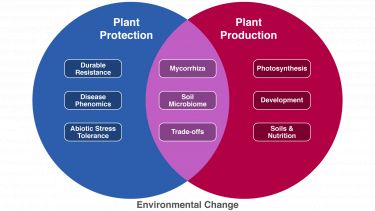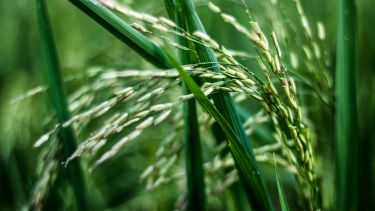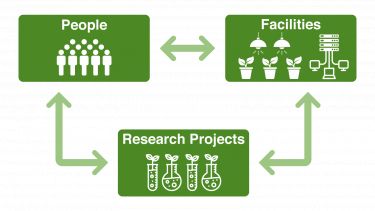Plant production and protection
Our plant production and protection research draws on our wealth of plant and soil science expertise and capitalises on our unparalleled ability to work across biological scales, from the genome to the global atmosphere.

Plant production and protection draws on our wealth of expertise in plant and soil biology. It benefits from our unparalleled ability to work across biological scales, ranging from the level of the molecule, gene and cell to research on crops at the field and population level. We believe that understanding life in a changing environment is key to future sustainable food research. This pillar benefits from major investments in research facilities, including plant growth facilities, mass spectrometry, next generation DNA sequencing, high-resolution microscopy and plant phenotyping equipment.
The science within this pillar integrates plant and soil biology into three main themes: plant production, plant protection and environmental change.
Plant production
The basis of plant production is photosynthesis, the biochemical process by which plants transform light energy into chemical energy and convert water and CO2 into organic matter. Plant biologists in Sheffield have a long-standing tradition of studying the molecular and biochemical principles underpinning photosynthesis, dating back the Robert Hill institute. Taking advantage of the available research facilities, including high-resolution microscopy, next-generation DNA sequencing, plant phenotyping and mass spectrometry facilities, this focus has been expanded with studies that link photosynthesis metabolism to leaf structure, whole-plant development and plant reproduction. In addition, soil biologists and microbiologists within this theme study the complex interaction between soils, plants and microbiomes, which facilitate plant production via uptake of water and nutrients and determine the efficiency of soil nutrient cycles.
Plant protection
Pests and diseases, as well as abiotic stress (for example droughts and floods) can pose a serious threat to crop yield and food security. Improving plant resilience against these stresses represents an effective strategy to improve agricultural sustainability and address concerns of consumers and farmers about pesticide residues, unsustainable irrigation schemes and soil erosion. Using our high-resolution microscopy, next-generation DNA sequencing and mass spectrometry facilities, researchers under this theme investigate the biochemical and (epi)genetic basis of plant immunological pathways, as well as interactions with beneficial soil microbes that improve plant resilience against biotic and abiotic stress. In addition to mechanistic chemistry and biology, this theme includes population biology, investigating evolutionary interactions between plants, pests, diseases and beneficial organisms. The phenotyping facility of the institute represents forms an important resource for this research theme, since it provides researchers with high-throughput capability to establish functional links between durable resistance, plant genotype and environment.
Environmental change
Climate change is rendering prime agricultural land unsuitable for food production. Accordingly, there is an urgent need to mitigate climate change through carbon capture and resilience of agricultural ecosystems against climate extremes. This theme encompasses research at the Leverhulme Centre for climate change mitigation (LC3M), which investigates the role of enhanced rock weathering as a means to cool the planet. In addition, researchers are conducting global geographical analyses and comparative field experiments to gain a better understanding of the domestication of crops and the impacts of climate change on agricultural ecosystems.
Key projects
ChemPrime – reviewing our dependancy on pesticides








